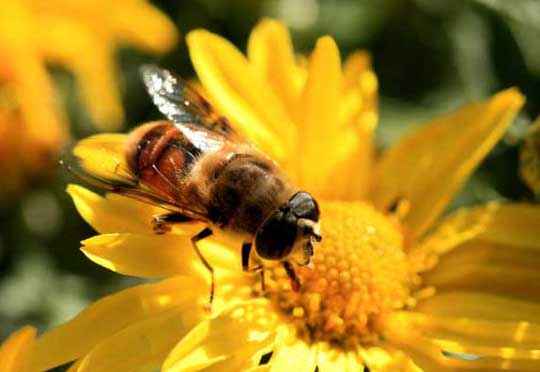(单词翻译:单击)
听力文本
This is Scientific American — 60-Second Science. I'm Christopher Intagliata.
We humans enjoy coffee and tea, to give our brains a caffeine boost. And bees sometimes sip nectar that naturally contains caffeine, which seems to enhance their memory. Now a study suggests that bees enjoy another familiar drug produced by plants: nicotine.
"As it turns out, not just in humans, but even the bees seem to have difficulties quitting." Lars Chittka, a professor of behavioral and sensory ecology at Queen Mary University of London.
Chittka and his colleagues studied bumblebees as they visited fake flowers that contained varying levels of nicotine. Unnaturally high nicotine concentrations deterred the bees. But at real-world levels, the drug attracted bees. And they even learned a flower's color faster, if that flower offered a nicotine fix.
Sometimes bees paid a steep price for this preference. "They returned actually to flowers that had previously sold them nicotine, so to speak, even if these flowers no longer contained nectar."

Which might give nicotine-pushing plants, like tobacco, an edge. "It provides these plant species with an unfair advantage over competing plants, because they can retain the faithful services of pollinators, even if they're offering suboptimal nectar in this case."
The results are in the journal Scientific Reports.
And if caffeine and nicotine have these effects on bees? Perhaps natural floral pharmacies stock other drugs too—that enhance pollination, and give bees a buzz.
Thanks for listening for Scientific American — 60-Second Science Science. I'm Christopher Intagliata.
参考译文
这里是科学美国人——60秒科学。我是克里斯托弗·因塔利亚塔。
我们人类享用咖啡和茶,用咖啡因为大脑提神。蜜蜂有时会吮吸含有天然咖啡因的花蜜,这似乎可以增强它们的记忆力。现在一项研究表明,蜜蜂也享用另一种由植物产生的我们所熟悉的药物:尼古丁。
“事实证明,不仅是人类,就连蜜蜂似乎也很难戒掉尼古丁。”伦敦玛丽女王大学的行为与感官生态学教授拉尔斯·奇特卡说道。
奇特卡和同事制造了尼古丁含量不同的假花,并对前往假花处采蜜的大黄蜂进行了研究。尼古丁浓度高于自然水平会使大黄蜂望而却步。但是当浓度保持在自然水平时,尼古丁就会吸引来大黄蜂。如果花朵持续提供尼古丁,那大黄蜂甚至可以更快地识别花朵颜色。
有时蜜蜂会为这种偏好付出高昂的代价。“实际上,它们会回到以前曾为它们提供尼古丁的花朵,即使这些花已经无蜜可采了。”
这可能为烟草等含有尼古丁的植物带来优势。“在植物的竞争中,蜜蜂为这些植物物种提供了不公平的优势,因为这些植物可以持续为传粉者提供可靠的服务,即使在这种情况下,它们提供的是次优花蜜。”
这一研究结果发表在《科学报告》期刊上。
是否只有咖啡因和尼古丁会对蜜蜂产生这些影响?也许“天然植物药房”还存有其他药物,可以增加授粉、吸引蜜蜂。
谢谢大家收听科学美国人——60秒科学。我是克里斯托弗·因塔利亚塔。
译文为可可英语翻译,未经授权请勿转载!
重点讲解
重点讲解:
1. turn out 原来是;结果发现;
例句:The bank may yet be vindicated by outside events and turn out to have provided Brazil with a soft landing.
目前的环境证明了银行的正确性,也给巴西提供了一个软着陆的机会。
2. so to speak 可以说;可谓;
例句:The five countries have now all passed, so to speak, their entry test.
可以说,这5个国家现在都已经通过了入门考试。
3. even if 即使;尽管;纵然;
例句:Try to act naturally, even if you're tense.
即使紧张也不要做作。


